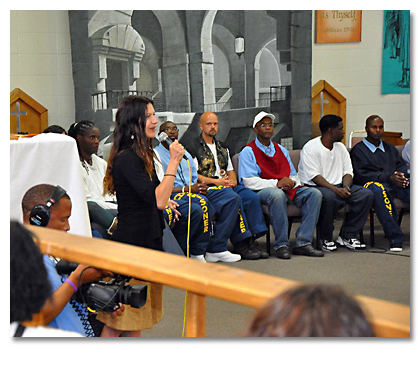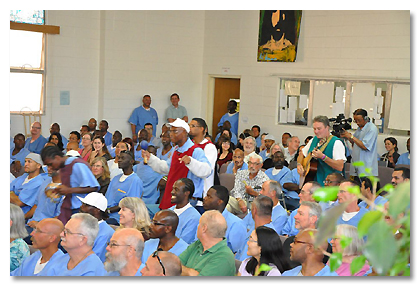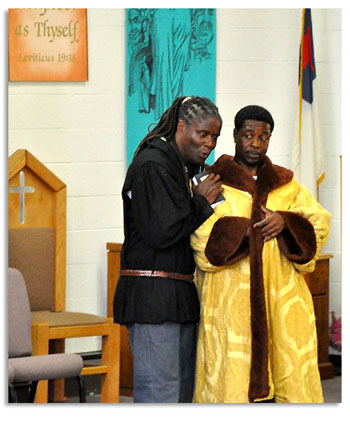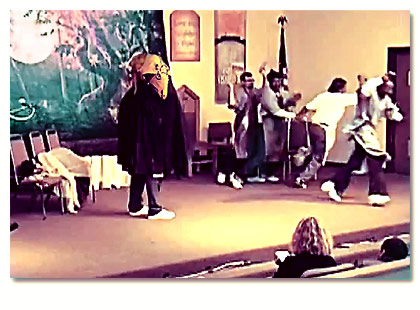 In 2003, Marin Shakespeare Company started Shakespeare at San Quentin. We were inspired by the work of Curt Tofteland, whose program was documented in the film “Shakespeare Behind Bars”.
In 2003, Marin Shakespeare Company started Shakespeare at San Quentin. We were inspired by the work of Curt Tofteland, whose program was documented in the film “Shakespeare Behind Bars”.
The original teacher was Jonathan Gonzalez. Jonathan was joined periodically by Aldo Billingsley, Lesley Currier, Robert Currier, and Paul Sulzman who performed Shakespeare scenes for and with inmate actors. The men also performed sonnets. In 2006, they presented a workshop production of “Macbeth” in the Art Room for an invited audience of about 30 people.
 In 2007, Jonathan left Marin and Suraya Keating became the lead teacher. Suraya brought skills as a licensed Drama Therapist to the program. In 2008, the men performed their first full-length Shakespeare play, “Much Ado About Nothing” in the Protestant Chapel, which seats 300.
In 2007, Jonathan left Marin and Suraya Keating became the lead teacher. Suraya brought skills as a licensed Drama Therapist to the program. In 2008, the men performed their first full-length Shakespeare play, “Much Ado About Nothing” in the Protestant Chapel, which seats 300.
The men rehearse each Shakespeare play for about 8 months. During the final few months, they are joined by a handful of outside actors. Since 2011, these outside actors have included students training for a Masters degree in Drama Therapy. Classes include check-ins, theatre skill-building exercises, Shakespeare study, rehearsal, and reflection.
Typically, we are able to schedule no more than a couple rehearsals in the Protestant Chapel prior to the one public performance. Usually, costumes and props are not allowed into the prison until the day of the performance. There are other obstacles to be overcome, such as prison-wide lock-downs, men transferred to other institutions, and delays due to a variety of security situations. The prison staff’s support of the program has been essential to its success.
For the past few years, in addition to performing a Shakespeare play, the men have written and performed autobiographical stories inspired by the themes in the plays. Some of these scripts are available online.
We believe that arts programs in correctional institutions give inmates a valuable tool for healing, growth and change. Inmates who study and perform Shakespeare challenge themselves to achieve something most had never dreamed of before coming to prison. They learn to work together as a team, resolve problems creatively, express emotions, practice empathy and compassion, set goals, understand themselves and others more deeply, and achieve something which can make them and their families proud.
“Stories from San Quentin”, the Parallel Plays written by the men, allow them to connect the themes of Shakespeare’s plays with their own lives. The stories inspired by “Hamlet” touch on revenge, suicide, forgiveness for murder, abandonment by mothers, and conscience among other themes. They are moving testaments to power of Shakespeare’s inspiration.
In 2014, the California Arts Council chose Marin Shakespeare Company as one of seven recipients of its inaugural Arts in Corrections grant program. Funding supports Shakespeare at San Quentin, as well as Shakespeare at Solano Prison.

We have been grateful to the support of the California Arts Council, William James Association, Cal Humanities, the Rosenberger Family Fund, and Santa Clara University for their support.
Shakespeare at San Quentin is a program of Marin Shakespeare Company. If you’d like more information, or would like to help support this work, please contact Lesley Schisgall Currier at Marin Shakespeare Company.

This project was made possible with support from Cal Humanities, a non-profit partner of the National Endowment for the Humanities. Visit www.calhum.org.
To make a donation in support of Shakespeare at San Quentin, click here
